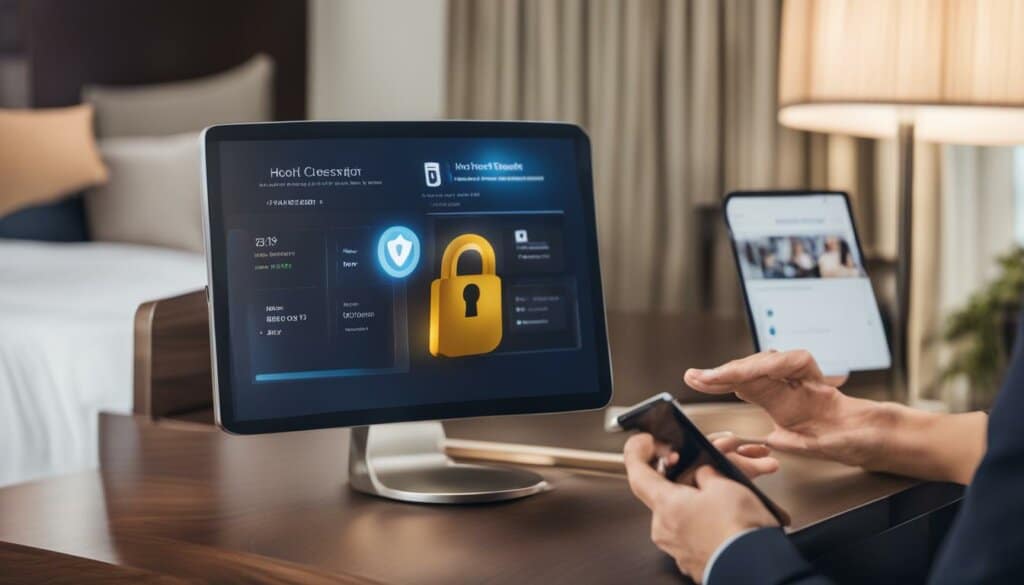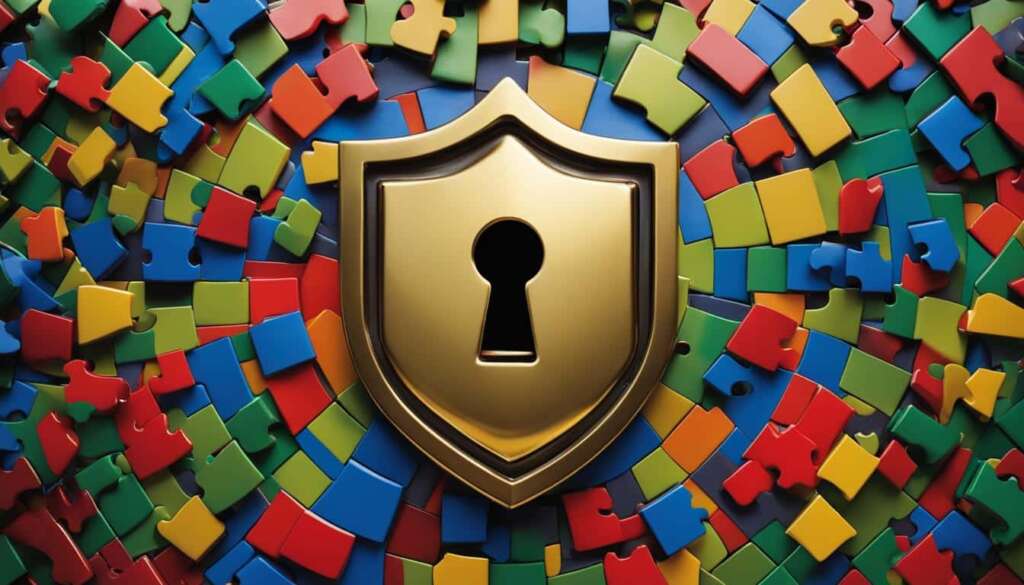Table of Contents
Welcome to our article series on cybersecurity in the hospitality industry. In today’s digital era, where data breaches are becoming increasingly common, it is crucial for hotels and other hospitality businesses to prioritize cybersecurity measures to protect sensitive guest data. In this article, we will explore the biggest data security concerns in the industry and provide best practices for ensuring hotel cybersecurity.
In an industry that collects and stores a vast amount of personal guest data, the hospitality sector is an attractive target for cybercriminals. With the potential risk of data compromises, it is vital for hotels to implement robust cybersecurity protocols to safeguard guest information and maintain their trust.
Stay tuned for the upcoming sections as we delve deeper into the specific data security concerns in the hospitality industry. We will discuss complex ownership structures, reliance on paying by card, high staff turnover, compliance regulations, and insider threats. Additionally, we will provide you with actionable best practices for ensuring data security in your hotel or hospitality business.
Data Security Concerns in Hospitality
The hospitality industry is faced with numerous data security concerns that require specific measures to ensure the protection of guest data. Cybersecurity measures and best practices play a crucial role in safeguarding sensitive information and mitigating the risks associated with data breaches. This section explores some of the key challenges faced by the hospitality industry and the recommended security measures to address them.
Complex Ownership Structures in the Hospitality Industry
The existence of complex ownership structures within the hospitality industry poses a significant challenge to data security. With multiple stakeholders involved, securing and managing data across different systems becomes more difficult. The Wyndham Worldwide breaches in 2008 and 2010 highlighted the vulnerabilities associated with such structures, emphasizing the need for improved security measures. To address this concern, hospitality organizations should implement robust cybersecurity protocols that encompass secure data sharing and access controls.
Reliance on Paying By Card
The hospitality industry heavily relies on credit card payments, making it an attractive target for cybercriminals. Point-of-sale systems are often targeted with malware, leading to widespread data breaches that can impact multiple hotels within the same operator. To mitigate this risk, implementing effective cybersecurity measures is essential. This includes regularly monitoring systems for any signs of compromise, implementing encryption for payment card information, and adopting strong firewalls and anti-malware solutions. By proactively addressing these challenges, hospitality organizations can enhance their data protection practices.
High Staff Turnover
High staff turnover in the hospitality industry poses a unique challenge when it comes to data security. Constantly onboarding new employees means that maintaining a well-trained workforce focused on data protection can be challenging. To address this concern, hospitality organizations should prioritize continuous cybersecurity training for all employees. Additionally, strict access controls should be implemented to ensure that only authorized personnel have access to sensitive guest data. By prioritizing training and access controls, organizations can mitigate the risks of insider threats and ensure compliance with data protection regulations.
Compliance
The hospitality industry is subject to various compliance regulations, such as GDPR and PCI DSS, aimed at protecting personal data and credit card information. Non-compliance with these regulations can result in substantial fines and damage to the organization’s reputation. To maintain data security and comply with regulations, hospitality organizations should implement robust cybersecurity measures, conduct regular audits and assessments, and stay up-to-date with the latest regulatory requirements.
| Data Security Concerns | Recommended Measures |
|---|---|
| Complex ownership structures | Implement robust cybersecurity protocols for secure data sharing and access controls. |
| Reliance on card payments | Regularly monitor systems for signs of compromise, implement encryption for payment card information, and use strong firewalls and anti-malware solutions. |
| High staff turnover | Prioritize continuous cybersecurity training and enforce strict access controls for sensitive guest data. |
| Compliance | Implement robust cybersecurity measures, conduct regular audits, and stay up-to-date with regulatory requirements. |
Complex Ownership Structures
In the hospitality industry, complex ownership structures pose significant vulnerabilities when it comes to data security. With multiple properties, franchises, and management companies, securing and managing data across different systems becomes a challenge. The existence of numerous stakeholders and varying IT infrastructure adds complexity to implementing robust cybersecurity protocols.
An example that highlights the implications of complex ownership structures on data security is the Wyndham Worldwide breaches in 2008 and 2010. Wyndham Worldwide, a global hospitality company, suffered three major data breaches, compromising the personal and financial information of thousands of guests. These breaches exposed the vulnerabilities that arise when managing data within a complex ownership structure.
“The Wyndham breach serves as a cautionary tale for the hospitality industry. It underscores the importance of having a unified approach to cybersecurity in complex ownership structures. Without adequate security measures and centralized control, sensitive guest data is at risk, leading to severe consequences for both the affected guests and the reputation of the hospitality brand.” – Cybersecurity Expert
To address the vulnerabilities presented by complex ownership structures, hospitality organizations must establish robust cybersecurity protocols that transcend individual property ownership. This includes implementing centralized security measures, such as firewalls, intrusion detection systems, and encryption protocols, to safeguard the flow of data across the entire network.
| Key Considerations for Complex Ownership Structures | Recommended Solutions |
|---|---|
| Streamlining data management | Implementing a centralized data management system that ensures consistent security protocols across all properties. |
| Standardizing security measures | Adopting a comprehensive cybersecurity framework that includes firewalls, antivirus software, and regular security updates. |
| Implementing secure network connections | Establishing secure virtual private networks (VPNs) to safeguard data transmission within the complex ownership structure. |
| Regular security audits | Conducting periodic audits to identify vulnerabilities and ensure compliance with industry regulations. |
Reliance on Paying By Card
The hospitality industry heavily relies on credit card payments, making it a prime target for cybercriminals seeking to exploit vulnerabilities in point-of-sale systems. Malware can be injected into these systems, allowing hackers to gain unauthorized access to sensitive guest data. This poses significant cybersecurity risks and can lead to data breaches that affect multiple hotels within the same operator.
Implementing robust cybersecurity solutions is essential to mitigate these risks and protect guest data. One of the key measures is to regularly monitor and update point-of-sale systems to detect and prevent any potential breaches. This includes installing and maintaining firewalls, intrusion detection systems, and anti-malware software to safeguard against cyber threats.
Additionally, encrypting payment card information is crucial to ensure that even if the data is compromised, it remains unreadable to unauthorized individuals. Encryption acts as an additional layer of protection, making it incredibly difficult for hackers to access and misuse sensitive information.
“Securing payment card transactions is paramount for the hospitality industry. By implementing strong security measures and ensuring compliance with industry standards such as the Payment Card Industry Data Security Standard (PCI DSS), hotels can significantly reduce the risk of data breaches and protect their guests’ personal information.” – Cybersecurity Expert
Regular staff training is also essential in maintaining data security. Employees should be educated about the importance of cybersecurity best practices, including the safe handling of payment card information and recognizing potential phishing scams. By fostering a culture of awareness and vigilance, hospitality organizations can minimize the chances of insider threats and human errors that could compromise guest data.
| Cybersecurity Risks | Cybersecurity Solutions |
|---|---|
| Data breaches resulting in guest information exposure | Regular monitoring and updating of point-of-sale systems, encryption of payment card information, implementation of firewalls and anti-malware software |
| Unauthorized access to payment card information | Strict compliance with PCI DSS, regular staff training on handling payment card information, recognition of potential phishing scams |
| Insider threats and human errors | Vigilant staff training, creating a culture of awareness, strict access controls |
Cybersecurity Protocols and Best Practices for High Staff Turnover
High staff turnover poses a significant challenge for maintaining robust data security in the hospitality industry. With frequent changes in personnel, ensuring a well-trained workforce focused on cybersecurity becomes paramount. Implementing effective cybersecurity protocols and best practices can help mitigate the risks associated with high staff turnover and enhance data protection.
One of the key cybersecurity protocols is the implementation of comprehensive training programs for all employees. These programs should cover the basics of data security, including password hygiene, email phishing awareness, and safe browsing practices. By equipping staff with the necessary knowledge and skills, organizations can minimize the likelihood of accidental data breaches and mitigate the impact of insider threats.
Strict access controls are another crucial component of cybersecurity best practices. Limiting access to sensitive guest data based on job roles and responsibilities helps prevent unauthorized access and reduces the risk of data misuse. Regularly reviewing and updating access privileges based on employee turnover ensures that only authorized personnel have access to the necessary information, thus minimizing potential vulnerabilities.
“Effective training programs and stringent access controls are essential to maintain data security in the face of high staff turnover. By empowering employees with cybersecurity knowledge and limiting access to sensitive data, hospitality organizations can mitigate the risks posed by insider threats and ensure compliance with data protection regulations.” – Cybersecurity Expert
Table: Key Best Practices for Data Security in High Staff Turnover
| Best Practice | Description |
|---|---|
| Comprehensive Training Programs | Provide regular training sessions covering data security basics, password hygiene, email phishing awareness, and safe browsing practices. |
| Strict Access Controls | Implement access controls based on job roles and responsibilities, regularly reviewing and updating access privileges to minimize vulnerabilities. |
| Employee Awareness Campaigns | Conduct periodic awareness campaigns to reinforce cybersecurity practices and ensure employees remain vigilant about the potential risks. |
| Regular Security Audits | Conduct regular security audits to identify vulnerabilities, assess the effectiveness of existing protocols, and implement necessary improvements. |
Employee awareness campaigns also play a crucial role in maintaining data security. Periodic reminders and updates about cybersecurity best practices help keep employees vigilant and reinforce the importance of protecting guest data. By fostering a culture of security awareness, organizations can mitigate the risk of data breaches caused by human error.
Regular security audits are essential for identifying vulnerabilities, assessing the effectiveness of existing protocols, and implementing necessary improvements. By conducting comprehensive assessments, organizations can stay proactive in their cybersecurity efforts, staying one step ahead of cyber threats and adapting their protocols as needed.
Hospitality Industry Vulnerabilities and Cybersecurity Measures
In the digital age, the hospitality industry faces various vulnerabilities that make it an attractive target for cybercriminals. The collection and storage of sensitive guest data make data breaches and cyber attacks a significant concern. To safeguard guest information and protect their reputation, hospitality organizations must implement robust cybersecurity measures.
One of the vulnerabilities in the hospitality industry relates to compliance with data protection regulations. Regulations such as the General Data Protection Regulation (GDPR) and Payment Card Industry Data Security Standard (PCI DSS) place stringent requirements on the industry to protect personal data and credit card information. Non-compliance can result in severe penalties and reputational damage. It is crucial for hospitality organizations to stay up-to-date with regulatory requirements and implement appropriate cybersecurity measures to maintain data security.
“Protecting guest data in the hospitality industry requires proactive cybersecurity measures and adherence to compliance regulations.”
In addition to compliance, insider threats pose a significant risk to data security in the hospitality industry. Employees with access to guest data may be tempted to sell this information, compromising the security and trust of guests. To mitigate this risk, hospitality organizations should enforce strict access controls, conduct thorough employee training programs, and implement continuous monitoring systems to detect any suspicious activity.
| Cybersecurity Measures | Description |
|---|---|
| Encryption | Implement strong encryption protocols to protect payment card information and sensitive guest data. |
| Employee Training | Provide regular cybersecurity training to all staff members to raise awareness and educate them about potential threats. |
| Firewalls and Anti-Malware | Install and maintain firewalls and anti-malware software to prevent unauthorized access and protect against malicious attacks. |
| Regular Testing | Conduct regular cybersecurity vulnerability assessments and penetration testing to identify and address any weaknesses in the system. |
By implementing these cybersecurity measures and staying vigilant, hospitality organizations can minimize vulnerabilities and protect guest data, ensuring customers feel secure and confident in their choice of accommodation.

Insider Threats
The hospitality industry faces significant data security risks from insider threats, where employees exploit their access to sell guest data to cybercriminals. An insider threat can result in severe financial and reputational damage to hotels and compromise the trust of their guests. It is crucial for hospitality organizations to implement robust cybersecurity best practices to prevent and detect insider threats.
Strict access controls should be implemented to limit employee access to sensitive data. By assigning user roles and permissions based on job responsibilities, hotels can ensure that only authorized employees have access to guest data. Additionally, regular monitoring of employee activities can help detect any suspicious behavior that may indicate an insider threat.
A well-trained workforce is essential in mitigating insider threats. Providing comprehensive cybersecurity training to employees can help them understand the importance of data protection and the potential consequences of insider threats. Training programs should cover topics such as identifying potential threats, reporting suspicious activities, and adhering to data security protocols.
“Insider threats in the hospitality industry can have devastating consequences on a hotel’s reputation and bottom line. Hoteliers must prioritize employee training and implement strict access controls to protect guest data from insider threats.” – Cybersecurity Expert
The Role of Technology in Preventing Insider Threats
Technological solutions can also play a vital role in preventing insider threats in the hospitality industry. Implementing advanced monitoring systems that track employee activities and detect anomalies can help identify potential insider threats. These systems can generate alerts when employees access data outside their authorized scope or engage in suspicious activities.
Furthermore, encryption plays a critical role in preventing insider threats. By encrypting guest data, hotels can ensure that even if it falls into the wrong hands, it remains unreadable and unusable. This adds an extra layer of protection against insider threats attempting to sell or misuse guest data.
Table: Examples of Insider Threat Prevention Measures
| Prevention Measure | Description |
|---|---|
| Strict Access Controls | Implement role-based access controls to limit employee access to sensitive data. |
| Employee Training | Provide comprehensive cybersecurity training to educate employees on data protection and the risks associated with insider threats. |
| Advanced Monitoring Systems | Implement monitoring systems that track employee activities and detect suspicious behavior or unauthorized access to sensitive data. |
| Data Encryption | Encrypt guest data to ensure it remains unreadable and unusable in the event of a data breach or insider threat. |
By combining strict access controls, employee training, advanced monitoring systems, and data encryption, hospitality organizations can significantly reduce the risk of insider threats and safeguard guest data. However, it is essential to continually assess and update these preventive measures to stay ahead of evolving cyber threats and protect the privacy and trust of guests.
Best Practices for Data Security in Hospitality
The hospitality industry is constantly at risk of cyberattacks due to the valuable guest data it collects and stores. To protect this sensitive information, implementing cybersecurity best practices is crucial. Here are some recommended measures:
- Encryption for Payment Card Information: Encrypting credit card details helps to secure data during transmission and storage. By utilizing strong encryption algorithms, sensitive information remains protected even if it falls into the wrong hands.
- Continuous Cybersecurity Training: Regularly educating employees about the latest cybersecurity threats and best practices is essential in preventing data breaches. Training programs should cover topics such as identifying phishing emails, creating strong passwords, and recognizing suspicious activities.
- Adhering to Relevant Regulations: Remaining compliant with industry regulations, such as GDPR and PCI DSS, is critical for data security. These regulations establish guidelines for protecting personal data and credit card information, ensuring that appropriate security measures are in place.
- Implementing Cybersecurity Measures: Utilizing robust cybersecurity solutions, such as firewalls, intrusion detection systems, and anti-malware software, helps to safeguard against cyber threats. Regularly updating and patching these systems is also necessary to address emerging vulnerabilities.
- Regularly Testing Cybersecurity Defenses: Conducting thorough assessments and penetration tests allows organizations to identify weaknesses in their cybersecurity defenses. By proactively identifying vulnerabilities, necessary actions can be taken to strengthen the overall security posture.
Effective implementation of these best practices is essential for the hospitality industry to enhance its data security measures. By prioritizing cybersecurity, hotels can protect guest information and maintain their reputation as trusted establishments.
Remember, cybersecurity is an ongoing concern that requires continuous monitoring and adaptation. Staying informed about the latest threats and keeping security protocols up to date ensures that hospitality organizations stay one step ahead of cybercriminals.
Table: Comparison of Cybersecurity Solutions
| Solution | Advantages | Disadvantages |
|---|---|---|
| Firewalls | Prevents unauthorized access to networks, filters incoming/outgoing traffic | May cause performance issues, may not protect against advanced threats |
| Intrusion Detection Systems | Detects and alerts to suspicious activities, helps in incident response | Can generate false positives, requires ongoing management |
| Anti-Malware Software | Detects and removes malware, protects against known threats | May not effectively identify zero-day attacks, can impact system performance |
| Encryption | Secures data during transmission and storage | Requires additional processing power, may impact system performance |
Conclusion
Protecting guest data in the hospitality industry requires a comprehensive approach that includes robust cybersecurity measures, employee training, compliance with regulations, and efficient access controls. Maintaining the security of sensitive guest information is crucial for building trust with customers and safeguarding the reputation of hospitality organizations.
By implementing strong cybersecurity protocols, hospitality businesses can effectively mitigate the risks associated with cyber threats. Regularly updating security measures such as firewalls and anti-malware software helps protect against potential breaches and unauthorized access to guest data.
Furthermore, continuous cybersecurity training for employees is essential in raising awareness about potential threats and educating staff on best practices for data protection. This helps create a culture of security and reduces the risk of insider threats, such as employees selling guest data.
In addition, compliance with relevant regulations, including GDPR and PCI DSS, is vital for ensuring the proper handling and protection of personal data and credit card information. Adhering to these regulations not only helps avoid substantial fines but also demonstrates a commitment to data security and guest privacy.
In conclusion, hospitality organizations must prioritize cybersecurity measures to safeguard guest data and maintain the trust of their customers. By adopting comprehensive cybersecurity solutions, implementing effective training programs, and staying up-to-date with regulatory requirements, the industry can thrive in the digital era while ensuring the confidentiality and integrity of guest information.
FAQ
What are the biggest data security concerns in the hospitality industry?
The hospitality industry faces complex ownership structures, reliance on card payments, high staff turnover, compliance regulations, and insider threats, all of which contribute to data security risks.
How can complex ownership structures affect data security in the hospitality industry?
Complex ownership structures make it challenging to secure and manage data across different systems, increasing the risk of data compromises.
Why is the reliance on card payments a cybersecurity risk in the hospitality industry?
The hospitality industry heavily relies on credit card payments, making it a target for cybercriminals to infect point-of-sale systems with malware, leading to data breaches affecting multiple hotels within the same operator.
How does high staff turnover pose a challenge to data security in the hospitality industry?
High staff turnover makes it difficult to maintain a well-trained workforce focused on data security, highlighting the need for training programs and strict access controls to prevent insider threats.
What regulations does the hospitality industry need to comply with for data security?
The hospitality industry needs to comply with regulations such as GDPR and PCI DSS to protect personal data and credit card information. Non-compliance can result in substantial fines and reputational damage.
What are insider threats, and how do they affect data security in the hospitality industry?
Insider threats in the form of employees selling guest data pose a significant risk to data security. Strict access controls, thorough training, and continuous monitoring are essential to prevent and detect such threats.
What are some best practices for data security in the hospitality industry?
Implementing encryption for payment card information, conducting continuous cybersecurity training, adhering to relevant regulations, using cybersecurity measures like firewalls and anti-malware, and regularly testing cybersecurity defenses are some of the best practices for data security in the hospitality industry.
How can the hospitality industry protect guest data?
Protecting guest data in the hospitality industry requires a comprehensive approach that includes robust cybersecurity measures, employee training, compliance with regulations, and efficient access controls.
Source Links
- https://www.upguard.com/blog/cybersecurity-in-the-hospitality-industry
- https://www.linkedin.com/pulse/hospitality-techs-battle-data-security-protecting
- https://hospitalityinsights.ehl.edu/data-security-in-hospitality-best-practices







